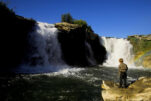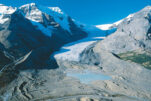Van Tighem shares concerns over Alberta’s water supply
By Steffanie Costigan - Lethbridge Herald Local Journalism Initiative Reporter on January 26, 2024.
Guest speaker Kevin Van Tighem spoke on the topic of water storage and drought at the Southern Alberta Council on Public Affairs on Thursday at noon.With the discussion of “how can we get more water?” SACPA was overwhelmed with a large turnout as eager community members squeezed into the dining room of the Lethbridge Senior Citizens Organization to hear from award-winning author Van Tighem.
“As we’re all painfully aware, we’re in the middle of a drought and all the signs are that it is probably going to get worse before it gets better… Every time we have a drought, everybody panics and wants to know what we can do about it to minimize the effects,” Van Tighem told the attentive audience.
“And in the past, that’s usually involved big announcements about dam construction…You can build all the dams you want. They don’t do any good if there’s no water to store behind them,” said Van Tighem during a summary of his presentation.
Van Tighem expressed the importance of water to southern Alberta.
“This is an important subject. Probably the most strategically important questions we should be asking ourselves in Alberta” about the future involve water, he said.
Van Tighem talked about the history of droughts in Alberta starting in 1977 to the early 1980s and the concern the droughts caused which prompted the Alberta government to make a decision to build the Oldman reservoir with hopes it would help with water supply in the future.
However, the decision “didn’t solve our problem. It did not get us more water,” said Van Tighem.
He detailed how Alberta water originates from headwaters in the mountains, in the foothills and snow melt, along with the Continental Divide. He talked about the current situation with the lack of snowfall this winter and what this means for water supply in Alberta.
“We have got less snow in the mountains than is usual, and the trend line is not very promising. You think the river was bad last year, you wait till this year unless we are surprised by a huge, massive dump of snow and really good rain during the spring.
“So this is real.This is going to be a hard year and it’s gonna be a hard year for the rivers, it’s gonna be hard here for those of us who rely on water,” said Van Tighem.
He said people should be prepared to face water restrictions.
“This climate is changing and not for the better. We need to take this stuff seriously. You can’t live without water. You can’t have an economy without water.”
Van Tighem said we lose 60 per cent of water, sometimes more, from canopy sublimation of tree branches. If the canopy is gone snowpack melts 30 per cent to 100 per cent faster.
He noted the management that should be taken to reduce the risk of water being lost.
“We should be doing some risk management, we should not be taking new risks, increasing the forest cut by 13 per cent. At this stage in history it doesn’t make a lot of sense to me.”
The speaker shared a story of a friend who calculated the cost of bottled water which turned out to be $4,400 per cubic metre of water.
“That suggests that maybe keeping that landscape healthy has some cash value. A lot of times you don’t need to sell water to attach an economic value to it.
“With things like climate change, they do put in a cash value, even though it’s never going to cost them anything. From a risk management point of view, you need to account for costs and benefits,” he said.
Van Tighem offered suggestions he has that he believes will save and increase water supplies in Alberta.
“Putting solar panels across all of our open canals right next to the fields where you need power to run the irrigation equipment. Reduce irrigation. . . if water is scarce, we should be coming up with smart ways to use less of it. And there’s a lot of things that we haven’t looked at because we are sort of in this constant denial mode,” said Van Tighem.
In closing he emphasized the change that needs to happen to conserve water.
“We’re talking about millions of dollars of future costs, because until we are managing that landscape that produces our water properly, we’re going to be losing water when we need it. 2
-1




